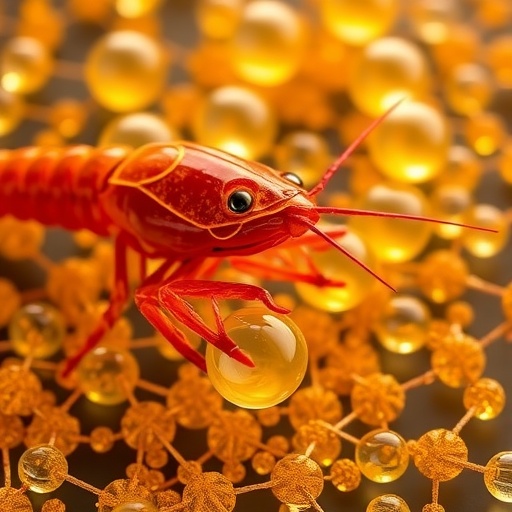Recent advancements in the field of pharmaceuticals and nutraceuticals have brought to light the promising effects of various natural compounds, particularly in the realm of drug delivery systems. In a groundbreaking study, researchers have explored the integration of krill oil into phospholipid bilayers to enhance the stability and cellular effects of curcumin encapsulated in liposomes. This innovative approach opens new avenues not only for the pharmaceutical industry but also for enhancing the bioavailability of curcumin, a compound renowned for its potent anti-inflammatory and antioxidant properties.
Curcumin, derived from turmeric, has long been celebrated for its wide-ranging health benefits. However, its application has been limited by its poor solubility and rapid metabolism in the body, which significantly diminishes its therapeutic potential. To circumvent these barriers, encapsulation techniques using liposomes have been employed. Liposomes serve as nano-sized carriers that can improve the solubility and protect the active compound from degradation, enhancing its delivery into targeted cells.
The incorporation of krill oil into the phospholipid matrix of liposomes is a novel strategy that researchers have investigated. Krill oil is rich in omega-3 fatty acids, particularly EPA and DHA, which are known to possess anti-inflammatory properties. By combining krill oil with phospholipid bilayers, the researchers aimed to augment the structural integrity of the liposomes that encapsulate curcumin. This approach is expected to not only improve the stability of curcumin but also to enhance its cellular effects once delivered.
The study conducted by Eum et al. meticulously details the methodology used to analyze the impact of krill oil on liposomal formulations containing curcumin. The researchers performed a series of stability tests, including storage stability and in vitro release profiles, to evaluate how the addition of krill oil affected the liposomal delivery system. Notably, the results indicated that liposomes containing krill oil exhibited greater stability compared to standard liposomes without krill oil, suggesting that the organic properties of krill oil may reinforce the phospholipid structure.
In terms of cellular effects, the researchers conducted assays to determine the degree of cellular uptake and cytotoxicity of the curcumin-loaded liposomes with and without krill oil. Cells treated with the liposomal formulation containing krill oil demonstrated significantly enhanced uptake of curcumin, leading to improved antiproliferative effects on cancer cell lines. This is a pivotal finding, indicating that the presence of krill oil not only stabilizes the liposomes but also facilitates better delivery and utilization of curcumin within the cells.
The researchers also delved into the molecular mechanisms underlying these enhanced cellular effects. They hypothesized that the omega-3 fatty acids present in krill oil might play a role in modulating cellular signaling pathways, which can lead to increased apoptosis in cancer cells. This suggests that krill oil may contribute not just as a passive ingredient in the liposomal formulation but as an active component that aids the therapeutic action of curcumin.
Furthermore, the research raises significant implications for the broader application of liposomal formulations in drug delivery. By utilizing natural products like krill oil, pharmaceutical scientists are adopting a more holistic approach to drug development, which may pave the way for more efficient and accessible therapies. The integration of such natural compounds into drug formulations aligns with the increasing consumer demand for cleaner, plant-based alternatives in medicine.
In light of the findings from this study, the potential for developing improved curcumin-based therapeutics is immense. Chronic diseases often result from inflammation and oxidative stress, areas where curcumin shows significant promise. With enhanced bioavailability and stability, formulations that employ krill oil could revolutionize how curcumin is used in treating various conditions, from cancer to cardiovascular diseases.
Moreover, this study has sparked discussions in the scientific community regarding the synergy between different natural ingredients in pharmaceutical formulations. The incorporation of fatty acids from sources like krill oil could lead to the exploration of other combinations that result in even more effective delivery systems. Researchers are now encouraged to think outside the box and consider how other natural oils and extracts could further improve liposomal formulations.
Ultimately, the findings underscore the importance of interdisciplinary research that merges nutrition, pharmacology, and biochemistry. The convergence of these fields is vital for developing innovative therapeutic strategies that are not only effective but also sustainable. As studies like this one continue to emerge, the potential for natural compounds to dominate pharmaceutical developments appears increasingly promising.
In summary, the incorporation of krill oil into phospholipid bilayers presents a significant advancement in the field of medicinal chemistry, particularly regarding the stability and cellular effects of curcumin. This research represents a critical step toward optimizing the therapeutic potential of natural compounds, providing a pathway for more effective treatments for chronic diseases that have long resisted conventional methods. The implications of this study are vast, potentially influencing how future pharmaceutical products are designed and formulated, ultimately benefiting patient health and wellness globally.
Subject of Research: The integration of krill oil into phospholipid bilayers for enhancing the stability and cellular effects of curcumin encapsulated in liposomes.
Article Title: Effect of krill oil incorporation into phospholipid bilayers on the stability and cellular effects of curcumin encapsulated in liposomes.
Article References:
Eum, SJ., Song, SB., Im, CW. et al. Effect of krill oil incorporation into phospholipid bilayers on the stability and cellular effects of curcumin encapsulated in liposomes. J. Pharm. Investig. (2025). https://doi.org/10.1007/s40005-025-00779-x
Image Credits: AI Generated
DOI: https://doi.org/10.1007/s40005-025-00779-x
Keywords: krill oil, curcumin, liposomes, phospholipid bilayers, bioavailability, drug delivery systems, omega-3 fatty acids, cellular effects, pharmacology, nutraceuticals.




